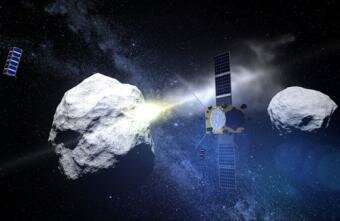A team of mathematical experts have said that 1729, which is also known as the Ramanujan-Hardy number, is linked to aspects of string theory and...

A US-European team, jointly in an attempt to save earth from meteorite strike, will knock an asteroid off its course. The mission will crash a probe into the smallest of a pair of binary asteroids to see if the object’s path can be altered.
The joint mission called ‘Asteroid Deflection & Assessment (Aida)’ will try to knock 750-metre wide asteroid Didymos off course using its mini-moon Didymoon in 2022.
An American probe called ‘Double Asteroid Redirection Test’ will hit into Didymoon, which orbits diamond-shaped Didymos. The European spacecraft will stay at the back and will keep an eye on the collision.
Scientists hope that this test strike will help them know whether in a principle strike, they will be able to deflect a massive asteroid threatening to wipe out human civilization or not.
Dr Patrick Michel, lead investigator for the European Space Agency half of the mission, said, “To protect Earth from potentially hazardous impacts we need to understand asteroids much better – what they are made of, their structure, origins and how they respond to collisions”.
Aida will be the first of its kind mission to study an asteroid binary system as well as the first to test whether path of an asteroid can be deflected through an impact with a spacecraft, he said.
The twin spacecraft will blast off in October 2020, with impact with the two asteroids scheduled for May 2022. The ESA sub-mission named the Asteroid Impact Mission will take measurements of Didymoon and deploy a landing craft to check out its surface.
Didymos made its closest recent approach to Earth in 2003 at a distance of 4.46 million miles, said experts. NASA is also working on a giant space shotgun capable of smashing space rocks out of orbit.









